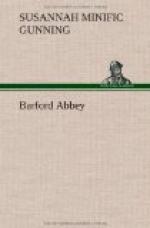Title: Barford Abbey
Author: Susannah Minific Gunning
Release Date: August 28, 2004 [EBook #13314]
Language: English
Character set encoding: ASCII
*** Start of this project gutenberg EBOOK Barford Abbey ***
This eBook was produced by Jonathan Ingram, Josephine Paolucci and the Online Distributed Proofreading Team.
BARFORD ABBEY,
A NOVEL:
IN A
Series of letters.
In two volumes.
VOL. I.
London:
Printed for T. CADELL, (Successor to Mr. Millar)
in the Strand; and J.
Payne, in Pasternoster-Row.
MDCCLXVIII.
BARFORD ABBEY.
LETTER I.
Lady Mary Sutton, at the German Spaw, to Miss Warley, in England.
How distressing, how heart-rending, is my dear Fanny’s mournful detail!—It lies before me; I weep over it!—I weep not for the departed saint: no; it is for you, myself, for all who have experienced her god-like virtues!—Was she not an honour to her sex? Did she not merit rewards too great for this world to bestow?—Could the world repay her innocence, her piety, her resignation? Wipe away, my best love, the mark of sorrow from your cheek. Perhaps she may be permitted to look down: if so, will she smile on those that grieve at her entering into the fullness of joy?—Here a sudden death cannot be called dreadful. A life like hers wanted not the admonitions of a sick-bed;—her bosom accounts always clear, always ready for inspection, day by day were they held up to the throne of mercy.—Apply those beautiful lines in the Spectator to her; lines you have so often admir’d.—How silent thy passage; how private thy journey; how glorious thy end! Many have I known more famous, some more knowing, not one so innocent.—Hope is a noble support to the drooping head of sorrow.—Though a deceiver, court her, I counsel you;—she leads to happiness;—we shall bless her deceptions:—baffling our enjoyments here, she teaches us to look up where every thing is permanent, even bliss most exquisite.
Mr. Whitmore you never knew, otherwise would have wonder’d how his amiable wife loiter’d so long behind.—Often she has wish’d to be reunited to him, but ever avoided the subject in your presence.
Keep not from me her rich bequest:—rich indeed,—her most valuable treasure.—That I could fold you to my arms!—But hear me at a distance;—hear me call you my beloved daughter,—and suppose what my transports will be when I embrace an only child:—yes, you are mine, till I deliver you up to a superior affection.




